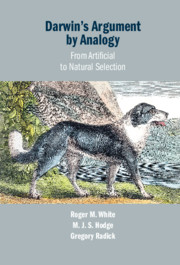Book contents
- Darwin’s Argument by Analogy
- Additional material
- Darwin’s Argument by Analogy
- Copyright page
- Contents
- Preface
- Introduction
- Chapter 1 Analogy in Classical Greece
- Chapter 2 Analogy in the Background to the Origin
- Chapter 3 Darwin’s Analogical Theorising before the Origin
- Chapter 4 The ‘One Long Argument’ of the Origin
- Chapter 5 An Analysis of Darwin’s Argument by Analogy
- Chapter 6 Darwin’s Use of Metaphor in the Origin
- Chapter 7 Rebuttals of the Revisionists
- Chapter 8 Wider Issues Concerning Darwinian Science
- References
- Index
- References
References
Published online by Cambridge University Press: 21 October 2021
- Darwin’s Argument by Analogy
- Additional material
- Darwin’s Argument by Analogy
- Copyright page
- Contents
- Preface
- Introduction
- Chapter 1 Analogy in Classical Greece
- Chapter 2 Analogy in the Background to the Origin
- Chapter 3 Darwin’s Analogical Theorising before the Origin
- Chapter 4 The ‘One Long Argument’ of the Origin
- Chapter 5 An Analysis of Darwin’s Argument by Analogy
- Chapter 6 Darwin’s Use of Metaphor in the Origin
- Chapter 7 Rebuttals of the Revisionists
- Chapter 8 Wider Issues Concerning Darwinian Science
- References
- Index
- References
Summary

- Type
- Chapter
- Information
- Darwin's Argument by AnalogyFrom Artificial to Natural Selection, pp. 237 - 246Publisher: Cambridge University PressPrint publication year: 2021

